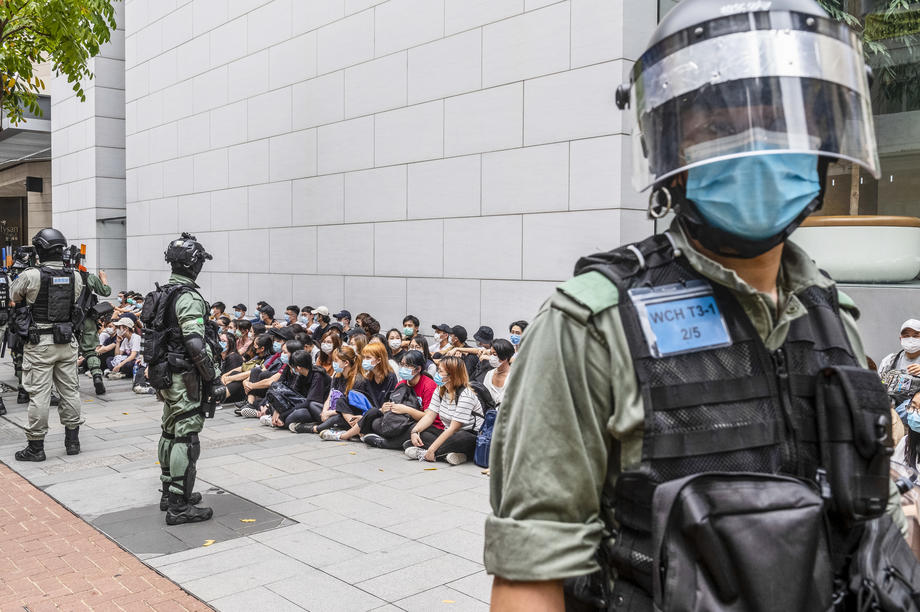The International Press Institute (IPI) today expressed grave concern over the future of press freedom in Hong Kong as lawmakers in Beijing voted to advance national security legislation with the clear potential to undermine fundamental rights in the territory, and Hong Kong’s government announced a “review” of the local public broadcaster.
China’s National People’s Congress on Thursday overwhelmingly voted in favour of new national security legislation for Hong Kong. The resolution paves the way for the standing committee of the NPC to draft the full legislation in the coming months, which is expected to criminalize acts that “endanger China’s national security” such as separatism, subversion and terrorism – concepts open to misuse against journalists who report not to Beijing’s liking. The draft law foresees allowing the national security apparatus of the Chinese government to set up agencies in Hong Kong to “fulfil relevant duties to safeguard national security in accordance with the law”.
As many as 2,878 NPC members voted for the bill, while one voted against it and six abstained. Once the NPC standing committee completes drafting the law, it will be implemented either through promulgation or local legislation and added to Annex III of Hong Kong Basic Law.
As the NPC voted on the bill, the Hong Kong administration announced that it had appointed a team of officials to review “governance and management” of Radio Television Hong Kong (RTHK). According to a statement issued by the Commerce and Economic Development Bureau (CEDB), the team will be led by a senior CEDB official and consist of officials from other departments. The team will review administration, resource deployment, human resources management and other aspects of RTHK, and ensure that the broadcaster complies with government rules and regulations.
The move is alarming: The Hong Kong administration recently began asserting control over RTHK, which has until now functioned as an independent broadcaster. However, on May 19, RTHK was forced to suspend its satirical comedy show Headliner and issue an apology after the Communications Authority of Hong Kong accused the broadcaster of “denigrating and insulting” the police in an episode of the Chinese-language show back in February. On the same day, the government demanded a full review of RTHK’s programme production and editorial processes, and called for any staff found to be responsible for “negligence or errors” to be disciplined.
“Although details still remain unclear, we fear that the national security law will be used by Beijing to control information in Hong Kong and punish and intimidate those who deviate from the Communist Party line”, IPI Deputy Director Scott Griffen said. “Combined with the move to ‘review’ the public broadcaster, it is clear that basic freedoms in Hong Kong, including press freedom and freedom of expression, are under threat. The international community must push back against these moves before it is too late.”
Charles Mok, a member of the Hong Kong Legislative Council, called the decision to “review” RTHK an “unprecedented move to control the public broadcaster”. Mok said that the review team “totally lacks independence” and expressed concern that the broadcaster might turn into a mouthpiece for the administration.
Lokman Tsui, assistant professor at the School of Journalism and Communication at the Chinese University of Hong Kong, told IPI that the administration’s forcing RTHK to suspend the satirical comedy show would be like U.S. President Trump demanding that Saturday Night Live be scrapped.
The national security bill was brought in response to Hong Kong’s pro-democracy movement, which through repeated mass protests last year successfully forced the Hong Kong government to withdraw a controversial bill that would have allowed for the extradition of criminal suspects to the mainland. Addressing the NPC on May 22, the vice chairman of the NPC standing committee, Wang Chen, said that the law meant “to prevent, frustrate and punish the small minority of criminal acts that harm national security is to offer better protection to the safety of life and property of the vast majority of Hong Kong people, as well as their basic rights and freedoms.”
According to sources in Hong Kong who spoke to IPI, journalists in the territory fear that authorities will use the new National Security law to clamp down on freedom of the press and expression of opinion by considering these activities as seditious or subversive. An analysis in Hong Kong’s South China Morning Post highlighted similar concerns. In the past, China has targeted activists, journalists, critics, and lawyers on the Chinese mainland using national security laws.
